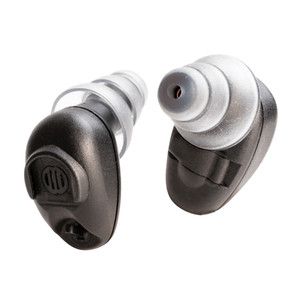Hearing Aids
Hearing aids provide amplification of hard-to-hear noises for those seeking to boost their ability to hear the sounds around them (TV, voices, birds, grandkids, etc.) The hearing aids we carry are generally designed to address mild to moderate hearing loss, they are far less expensive than the hearing aids you would get from an audiologist, and they are pre-programmed to a typical audiogram. The hearing aids we offer generally cannot be re-programmed to your specific audiogram (unless "Custom Programmable" is included in the description.) Some manufacturers refer to such generic hearing aids as "hearing amplifiers" or PSAPs (personal sound amplifying products.) The US FDA says that whatever you call them, hearing amplifiers, PSAPs, personal sound amplifiers, or hearing aids, they are all hearing aids and these "basic hearing aids" (meaning they do not need to be programmed to your specific audiogram) are safe to buy over the counter and use without the need to consult with an audiologist. In addition to the general hearing aids you find below, we also carry an extensive range of hunting hearing aids. Hunting hearing aids have two important differences from regular hearing aids. First, hunting hearing aids not only amplify low sounds, but they also protect your hearing by automatically limiting the volume of dangerously loud sounds, such as gunfire. Second, because they limit the volume of loud sounds, hunting hearing aids may not work, for you if you need a lot of amplification. To limit the dangerously loud noises, hunting hearing aids will only amplify low sounds up to a maximum of about 90dB, which might not be enough amplification to meet your specific needs in a hearing aid. A regular hearing aid, may, for example amplify what you hear up to as much as 130 dB. Not sure which kind of hearing aid you need? Here's some general advice:
- Choose a regular hearing aid if you will NOT be wearing them where you need ear protection from high noise, and you are considering getting hearing aids for the first time. We also suggest that for a first try, that you buy an inexpensive hearing aid, and then, after getting some experience with using those hearing aids, you might consider moving up to a more sophisticated hearing aid with better sound, better feedback protection, better wind noise protection, and more programs to choose from. Get in touch with our staff if you have questions and we will be happy to assist you.
- If you have worn hearing aids you obtained from an audiologist and you are looking for a less expensive alternative, you might try our mid-priced, multiple program models, but the low end hearing aids we offer will probably not meet your needs.
- Choose a hunting hearing aid if your primary use will be in areas where you could need hearing protection from loud noises such as gunfire, nail guns, shop noise, or industrial workplace noise. If you will be working in an OSHA regulated workplace, we suggest that you choose a hunting hearing aid that bears our "OSHA Compliant" seal.
- If you have any doubts about simply buying and using any hearing aid we sell, get a consult with a local doctor or audiologist. These professionals can test your hearing and give you an accurate diagnosis, help you select an appropriate hearing aid, and program it to meet your needs specifically. We do suggest that you ask first what it will cost, and whether your insurance will pay for it. If professional services are beyond your budget, you do not have to just suffer with your inability to hear. We sell a hearing aid for less than $10, and many more for less than $300, so keep us in mind and give an over the counter basic hearing aid a try. We are here to help.

